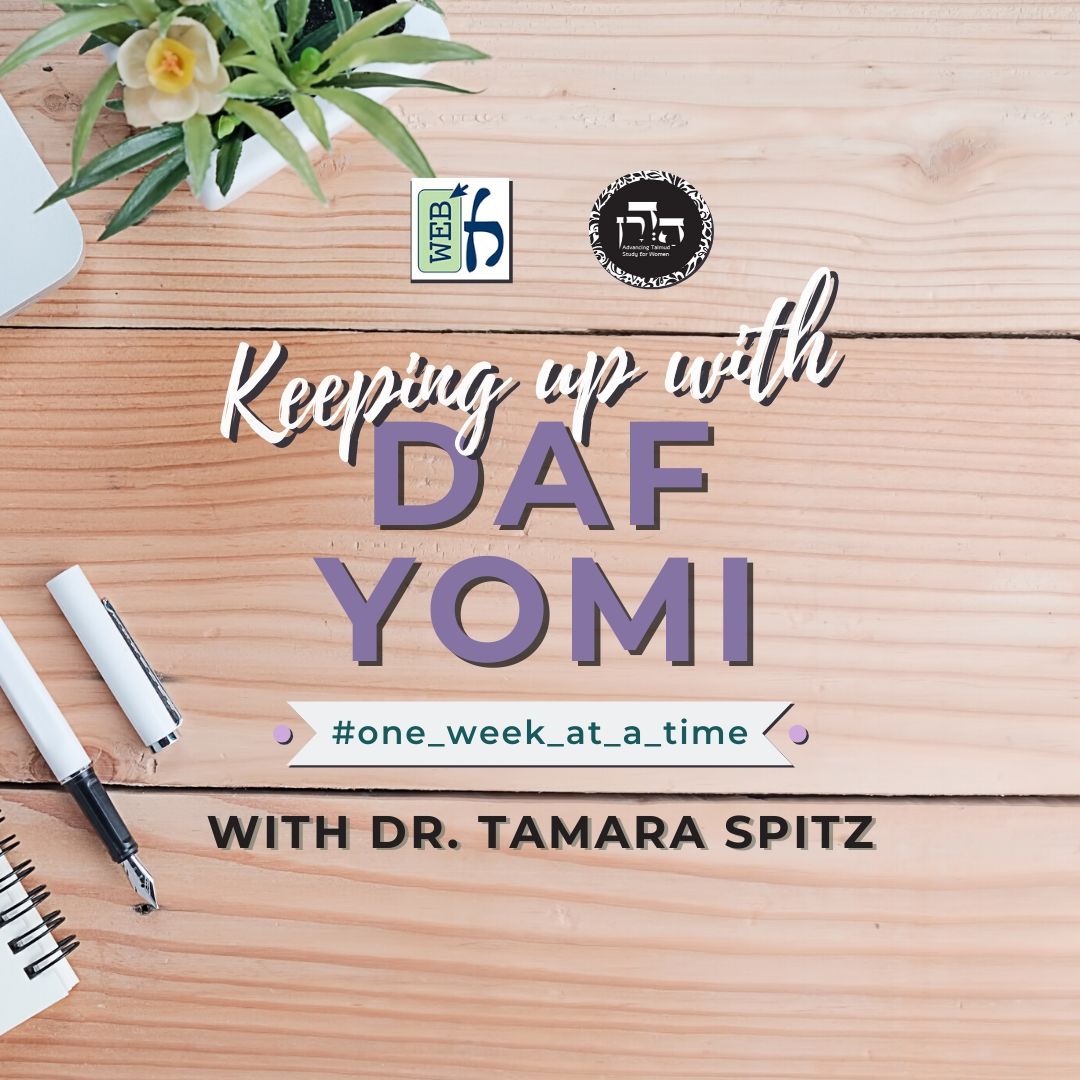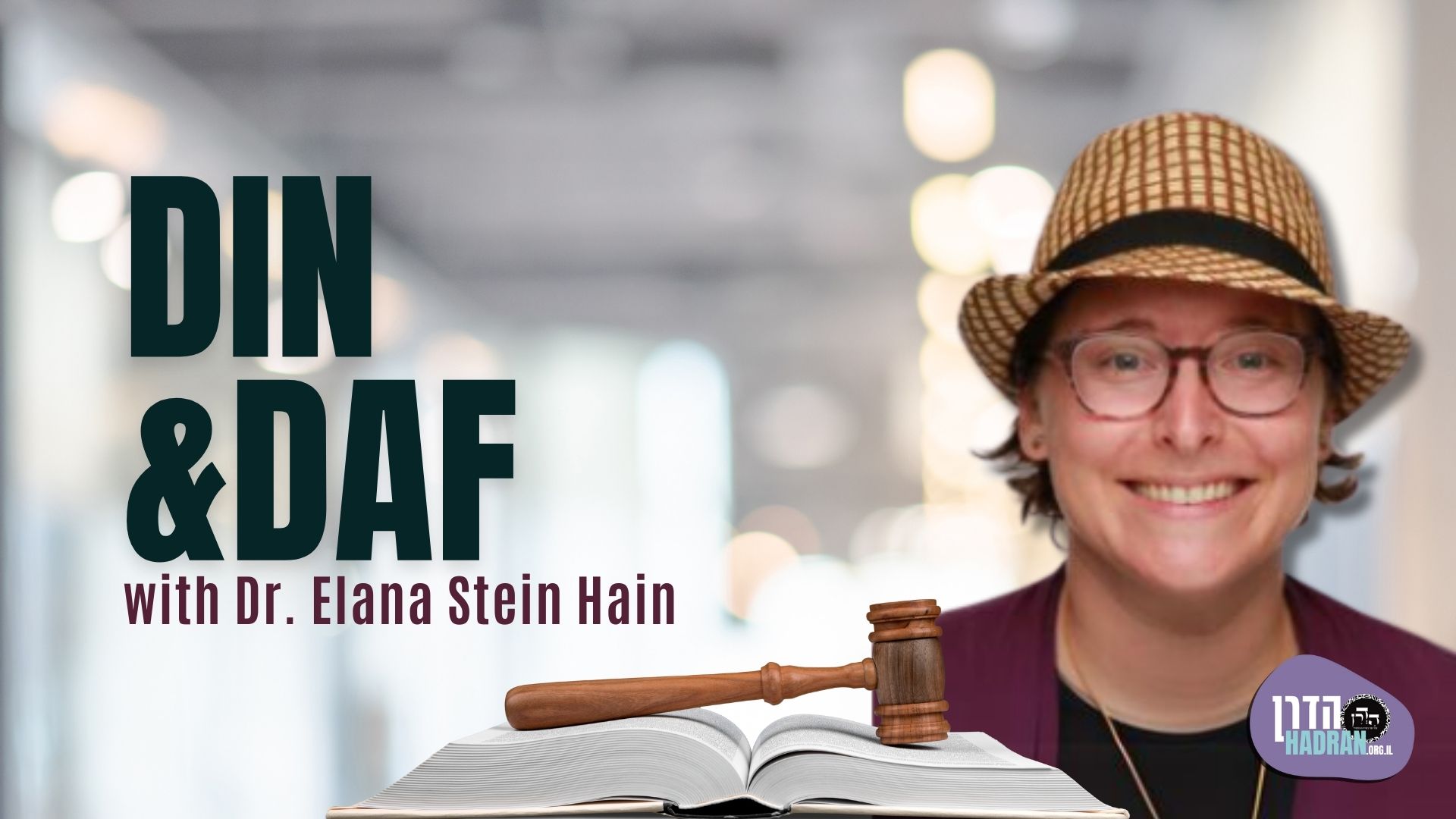Bava Batra 127
אַמֵּימָר אָמַר: אַף אֵינוֹ מְמַעֵט חֵלֶק בְּכוֹרָה, שֶׁנֶּאֱמַר: ״וְיָלְדָה לוֹ בָּנִים״ – עַד שֶׁיְּהֵא בֵּן בִּשְׁעַת לֵידָה.
Ameimar says: A tumtum who was found to be male also does not reduce the additional portion of the firstborn. His portion is not taken into account in the calculation of the firstborn’s additional portion. For example, if there are three brothers: A firstborn, an ordinary brother, and a tumtum, the firstborn receives one-third of the property as his additional portion, as he would if he and the ordinary brother were the only heirs, and the remaining two-thirds are divided among all three brothers. This is because it is stated with regard to the portion of the firstborn: “And they have borne him sons” (Deuteronomy 21:15), which is interpreted to mean that the brother of a firstborn does not affect his additional portion unless he is recognized as a son at the moment of his birth.
רַב שֵׁיזְבִי אָמַר: אַף אֵינוֹ נִימּוֹל לִשְׁמֹנָה, דְּאָמַר קְרָא: ״אִשָּׁה כִּי תַזְרִיעַ וְיָלְדָה זָכָר״, ״וּבַיּוֹם הַשְּׁמִינִי יִמּוֹל״ – עַד שֶׁיְּהֵא זָכָר מִשְּׁעַת לֵידָה.
Rav Sheizevi says: A tumtum who was found to be male is also not circumcised on the eighth day, if his eighth day occurs on Shabbat, although the mitzva of circumcision on the eighth day generally overrides Shabbat prohibtions. As the verse states: “If a woman bears seed and gives birth to a male then she shall be unclean seven days; as in the days of the impurity of her sickness shall she be unclean. And on the eighth day the flesh of his foreskin shall be circumcised” (Leviticus 12:2–3), which is interpreted to mean that he is not circumcised on the eighth day, in the event that it occurs on Shabbat, unless he is recognized as a male from the moment of his birth.
רַב שֵׁרֵבְיָא אָמַר: אַף אֵין אִמּוֹ טְמֵאָה לֵידָה, דְּאָמַר קְרָא: ״אִשָּׁה כִּי תַזְרִיעַ וְיָלְדָה זָכָר וְטָמְאָה שִׁבְעַת יָמִים״ – עַד שֶׁיְּהֵא זָכָר מִשְּׁעַת לֵידָה.
Rav Sherevya says: His mother is also not rendered ritually impure due to his birth, as the verse states: “If a woman bears seed and gives birth to a male, then she shall be unclean seven days,” which is interpreted to mean that she is not rendered impure unless he is recognized as a male from the moment of his birth.
מֵיתִיבִי: הַמַּפֶּלֶת טוּמְטוּם וְאַנְדְּרוֹגִינוֹס – תֵּשֵׁב לְזָכָר וְלִנְקֵיבָה. תְּיוּבְתֵּיהּ דְּרַב שֵׁרֵבְיָא! תְּיוּבְתָּא.
The Gemara raises an objection from a mishna (Nidda 28a): A woman who miscarries a tumtum or a hermaphrodite [ve’androginos] observes the strictures of a woman who gave birth to a male and to a female. Since it is uncertain whether the fetus is male or female, the woman must observe the halakhot of ritual impurity according to both possibilities. This appears to be a conclusive refutation of the statement of Rav Sherevya that a woman who gives birth to a tumtum is not rendered impure at all. The Gemara affirms: This is a conclusive refutation.
לֵימָא תֶּיהְוֵי תְּיוּבְתָּא דְּרַב שֵׁיזְבִי?
The Gemara asks: Shall we say it is also a conclusive refutation of the statement of Rav Sheizevi with regard to circumcision, as the halakha of circumsicion is stated together with the halakha of ritual impurity?
תַּנָּא סַפּוֹקֵי מְסַפְּקָא לֵיהּ, וּלְחוּמְרָא.
The Gemara answers: The tanna of the mishna in tractate Nidda is uncertain whether the birth discussed in the verse includes that of a tumtum, and therefore he rules stringently, that she should observe the halakhot of ritual impurity for both possibilities. Rav Sheizevi’s ruling can follow the same logic: The infant should not be circumcised on Shabbat, as it is uncertain whether the mitzva of his circumcision overrides the prohibitions of Shabbat.
אִי הָכִי, ״תֵּשֵׁב לְזָכָר וְלִנְקֵבָה וּלְנִדָּה״ מִיבְּעֵי לֵיהּ! קַשְׁיָא.
The Gemara asks: If so, that the tanna of the mishna in tractate Nidda is uncertain whether the birth discussed in the verse includes that of a tumtum, the mishna should have stated that the woman observes the strictures of a woman who gave birth to both a male and to a female, and also as a menstruating woman. If it is uncertain whether the halakhot of ritual purity after birth pertain to a woman who gives birth to a tumtum at all, she should observe the halakhot of ritual impurity for any blood that emerges in the time period following the birth, as it should have the status of the blood of a menstruating woman. The Gemara concludes: This poses a difficulty.
אָמַר רָבָא, תַּנְיָא כְּווֹתֵיהּ דְּרַבִּי אַמֵּי: ״בֵּן״ – וְלֹא טוּמְטוּם, ״בְּכוֹר״ – וְלֹא סָפֵק.
Rava says that it is taught in a baraita in accordance with the opinion of Rabbi Ami that a tumtum firstborn does not receive a double portion of the inheritance. The baraita states: From the phrase “the firstborn son” (Deuteronomy 21:15) it is derived that only a son receives a double portion, but not a tumtum, and only a definite firstborn receives a double portion, but not one about whom it is uncertain if he is a firstborn.
בִּשְׁלָמָא ״בֵּן״ וְלֹא טוּמְטוּם – כִּדְרַבִּי אַמֵּי. אֶלָּא ״בְּכוֹר״ וְלֹא סָפֵק – לְאַפּוֹקֵי מַאי?
The Gemara asks: Granted, the halakha that a son receives a double portion but a tumtum does not is understandable, as it is in accordance with the statement of Rabbi Ami, but what case does the halakha that only a definite firstborn receives a double portion but not one about whom it is uncertain if he is a firstborn serve to exclude? Why would one about whom it is uncertain if he is a firstborn receive a double portion?
לְאַפּוֹקֵי מִדְּדָרֵשׁ רָבָא, דְּדָרֵשׁ רָבָא: שְׁתֵּי נָשִׁים שֶׁיָּלְדוּ שְׁנֵי זְכָרִים בְּמַחֲבֵא, כּוֹתְבִין הַרְשָׁאָה זֶה לָזֶה.
The Gemara answers: It serves to exclude that which Rava taught, as Rava taught that if two wives of the same husband gave birth to two males in hiding, so that it is unknown which son was born first, and the husband subsequently had other sons, each of the two possible firstborns writes an authorization to the other. Since their brothers can claim against each of them individually that he is not the firstborn and does not deserve a double portion, each writes the other an authorization to collect his portion, so that they can jointly claim the additional portion in any event.
אֲמַר לֵיהּ רַב פָּפָּא לְרָבָא, וְהָא שְׁלַח רָבִין: דָּבָר זֶה שָׁאַלְתִּי לְכׇל רַבּוֹתַי וְלֹא אָמְרוּ לִי דָּבָר, בְּרַם כָּךְ אָמְרוּ מִשּׁוּם רַבִּי יַנַּאי: הוּכְּרוּ, וּלְבַסּוֹף נִתְעָרְבוּ – כּוֹתְבִין הַרְשָׁאָה זֶה לָזֶה. לֹא הוּכְּרוּ – אֵין כּוֹתְבִין הַרְשָׁאָה זֶה לָזֶה!
Rav Pappa subsequently said to Rava: But didn’t Ravin send a letter from Eretz Yisrael to Babylonia, stating: I asked all my teachers about this matter and they did not tell me anything; but this is what they said in the name of Rabbi Yannai: If the two sons were initially recognized, i.e., it was known which one of them was the firstborn, and they were ultimately mixed, and now the firstborn cannot be identified, each writes an authorization to the other. If they were not initially recognized, each does not write an authorization to the other.
הֲדַר אוֹקִי רָבָא אָמוֹרָא עֲלֵיהּ, וּדְרַשׁ: דְּבָרִים שֶׁאָמַרְתִּי לָכֶם – טָעוּת הֵן בְּיָדִי, בְּרַם כָּךְ אָמְרוּ מִשּׁוּם רַבִּי יַנַּאי: הוּכְּרוּ וּלְבַסּוֹף נִתְעָרְבוּ – כּוֹתְבִין הַרְשָׁאָה זֶה לְזֶה, לֹא הוּכְּרוּ – אֵין כּוֹתְבִין הַרְשָׁאָה זֶה לָזֶה.
Rava then established an amora to repeat his lesson to the masses aloud and taught: The statements that I said to you are a mistake on my part. But this is what they said in the name of Rabbi Yannai: If the two sons were initially recognized and were ultimately mixed, each writes an authorization to the other. If they were not initially recognized, each does not write an authorization to the other.
שְׁלַחוּ לֵיהּ בְּנֵי אַקְרָא דְאַגְמָא לִשְׁמוּאֵל, יְלַמְּדֵנוּ רַבֵּינוּ: הָיוּ מוּחְזָקִין בָּזֶה – שֶׁהוּא בְּכוֹר, וְאָמַר אָבִיו עַל אַחֵר ״בְּכוֹר הוּא״, מַהוּ? שְׁלַח לְהוּ: כּוֹתְבִין הַרְשָׁאָה
§ The residents of Akra De’Agma sent the following inquiry to Shmuel: Teach us, our master: If the court had a presumption concerning this son, that he is a firstborn, and his father says concerning another son of his: He is his firstborn, what is the halakha? Shmuel sent to them in response: Both of these sons write an authorization,
זֶה לָזֶה.
each to the other.
מָה נַפְשָׁךְ? אִי כְּרַבָּנַן סְבִירָא לֵיהּ, לִישְׁלַח לְהוּ כְּרַבָּנַן; אִי כְּרַבִּי יְהוּדָה סְבִירָא לֵיהּ, לִישְׁלַח לְהוּ כְּרַבִּי יְהוּדָה!
The Gemara questions this ruling: Whichever way you look at it, Shmuel’s opinion is difficult. If he holds in accordance with the opinion of the Rabbis with regard to this issue, he should have sent them a response in accordance with the opinion of the Rabbis, and if he holds in accordance with the opinion of Rabbi Yehuda, he should have sent them a response in accordance with the opinion of Rabbi Yehuda. Shmuel’s response is not in accordance with either tannaitic opinion.
מְסַפְּקָא לֵיהּ אִי כְּרַבִּי יְהוּדָה אִי כְּרַבָּנַן.
The Gemara answers: He is uncertain whether the halakha is in accordance with the opinion of Rabbi Yehuda or in accordance with the opinion of the Rabbis. Therefore he sent them a response that incorporates both opinions.
מַאי הִיא? דְּתַנְיָא: ״יַכִּיר״, יַכִּירֶנּוּ לַאֲחֵרִים.
The Gemara explains: What is the dispute between Rabbi Yehuda and the Rabbis? As it is taught in a baraita: Expounding the verse: “He shall acknowledge the firstborn” (Deuteronomy 21:17), the Sages said: He shall acknowledge him to others. In other words, a father is deemed credible to tell others that this is his firstborn.
מִכָּאן אָמַר רַבִּי יְהוּדָה: נֶאֱמָן אָדָם לוֹמַר: ״זֶה בְּנִי בְּכוֹר״. וּכְשֵׁם שֶׁנֶּאֱמָן אָדָם לוֹמַר ״זֶה בְּנִי בְּכוֹר״, כָּךְ נֶאֱמָן אָדָם לוֹמַר ״זֶה בֶּן גְּרוּשָׁה״ וְ״זֶה בֶּן חֲלוּצָה״. וַחֲכָמִים אוֹמְרִים: אֵינוֹ נֶאֱמָן.
From here, Rabbi Yehuda says that a man is deemed credible to say: This is my firstborn son, even if he has sons presumed to be older. And just as a man is deemed credible to say: This is my firstborn son, so too, a man who is a priest is deemed credible to say about his son: This is a son of a divorced woman, or: This is a son of a yevama who has performed ḥalitza [ḥalutza], in which cases he is disqualified from the priesthood due to his flawed lineage [ḥalal]. And the Rabbis say: He is not deemed credible.
אֲמַר לֵיהּ רַב נַחְמָן בַּר יִצְחָק לְרָבָא: בִּשְׁלָמָא לְרַבִּי יְהוּדָה – הַיְינוּ דִּכְתִיב: ״יַכִּיר״. אֶלָּא לְרַבָּנַן, ״יַכִּיר״ לְמָה לִי?
Rav Naḥman bar Yitzḥak said to Rava: Granted, according to Rabbi Yehuda, this is the reason that it is written: “He shall acknowledge;” he derives from these words that a father is deemed credible to attest to the identity of his sons. But according to the Rabbis, why do I need the term “he shall acknowledge”?
בִּצְרִיךְ הֶיכֵּרָא.
The Gemara answers: It is necessary for a case when he requires identification, i.e., when there is no presumption as to the identity of the firstborn. In such a situation the verse teaches that the father is deemed credible. The Rabbis disagree with Rabbi Yehuda’s opinion only in a case where another son is presumed to be the firstborn.
לְמַאי הִלְכְתָא, לְמִיתְּבָא לוֹ פִּי שְׁנַיִם? לֹא יְהֵא אֶלָּא אַחֵר – אִילּוּ בָּעֵי לְמִיתְּבָא לֵיהּ בְּמַתָּנָה, מִי לָא יָהֵיב לֵיהּ?!
The Gemara asks: According to the Rabbis, with regard to what halakha is it necessary for the verse to teach that a father’s identification of his firstborn is deemed credible? If it is with regard to giving him a double portion, it is superfluous. Let the son be only like another person, i.e., one who is not an heir; if the father wants to give him a double portion of his estate as a gift, can he not give it to him? Since the father can give a double portion to the firstborn without having to testify that he is his firstborn, it cannot be that the verse is teaching us that he is deemed credible with regard to the halakha that a firstborn receives a double portion.
לָא צְרִיכָא, בִּנְכָסִים שֶׁנָּפְלוּ לוֹ לְאַחַר מִכָּאן.
The Gemara answers: No, it is necessary with regard to property that came into the father’s possession afterward, after he testified that his son is his firstborn. He could not have given him this property as a gift, as at the time of his testimony, the property did not yet belong to him, and one cannot transfer ownership of an item that one does not own. Therefore, it is necessary for the verse to teach that the father’s testimony is deemed credible so that the son can receive a double portion of the father’s future property as well.
וּלְרַבִּי מֵאִיר, דְּאָמַר: אָדָם מַקְנֶה דָּבָר שֶׁלֹּא בָּא לָעוֹלָם, ״יַכִּיר״ לְמָה לִי?
The Gemara asks: And according to Rabbi Meir, who says that a person can transfer an entity that has not yet come into the world, which would mean that one can give away his property even before it enters his possession, why do I need the term “he shall acknowledge”?
בִּנְכָסִים שֶׁנָּפְלוּ לוֹ כְּשֶׁהוּא גּוֹסֵס.
The Gemara answers: The term is necessary for a case where property came into the father’s possession when he was moribund, at which point he cannot transfer ownership of any of his property to others. It is with regard to such property that the verse states: “He shall acknowledge,” to teach that the son who the father states is the firstborn will receive a double portion even of that property.
תָּנוּ רַבָּנַן: הָיוּ מוּחְזָקִין בּוֹ שֶׁהוּא בְּכוֹר, וְאָמַר אָבִיו עַל אַחֵר שֶׁהוּא בְּכוֹר – נֶאֱמָן. הָיוּ מוּחְזָקִין בּוֹ שֶׁאֵינוֹ בְּכוֹר, וְאָמַר אָבִיו: בְּכוֹר הוּא – אֵינוֹ נֶאֱמָן.
The Sages taught in a baraita (Tosefta 7:3): If the court had a presumption concerning a son that he is a firstborn, and his father said concerning another son of his that he is his firstborn, the father’s statement is deemed credible. If the court had a presumption concerning a son that he is not a firstborn, and his father said that he is his firstborn, the father’s statement is not deemed credible.
רֵישָׁא רַבִּי יְהוּדָה, וְסֵיפָא רַבָּנַן.
The Gemara asserts that as the two halakhot of the baraita seem to contradict each other, it must be that the first clause represents the opinion of Rabbi Yehuda, and the latter clause represents the opinion of the Rabbis.
אָמַר רַבִּי יוֹחָנָן: אָמַר ״בְּנִי הוּא״, וְחָזַר וְאָמַר ״עַבְדִּי הוּא״ – אֵינוֹ נֶאֱמָן. ״עַבְדִּי הוּא״, וְחָזַר וְאָמַר ״בְּנִי הוּא״ – נֶאֱמָן, דִּמְשַׁמֵּשׁ לִי כְּעַבְדָּא קָאָמַר.
§ Rabbi Yoḥanan says that if one says about another: He is my son, and then says: He is my slave, his latter statement is not deemed credible. It cannot disqualify him from marrying a Jewish woman or exclude him from his inheritance. Conversely, if he first says: He is my slave, and then says: He is my son, his latter statement is deemed credible, as in his first statement he presumably was saying: He serves me as a slave does.
וְחִילּוּפֵיהּ אַבֵּית הַמֶּכֶס – הָיָה עוֹבֵר עַל בֵּית הַמֶּכֶס וְאָמַר ״בְּנִי הוּא״, וְחָזַר וְאָמַר ״עַבְדִּי הוּא״ – נֶאֱמָן. אָמַר ״עַבְדִּי הוּא״, וְחָזַר וְאָמַר ״בְּנִי הוּא״ – אֵינוֹ נֶאֱמָן.
And the opposite halakha applies to one at the tax house: If one is passing the customs house and says about a certain person: He is my son, and then later says: He is my slave, his latter statement is deemed credible, as he presumably says that the other is his son only to evade paying a tax for possessing a slave. Conversely, if he says at the customs house: He is my slave, and then later says: He is my son, his latter statement is not deemed credible, as one would not unnecessarily render himself liable to pay a tax.
מֵיתִיבִי: הָיָה מְשַׁמְּשׁוֹ כְּבֵן, וּבָא וְאָמַר ״בְּנִי הוּא״, וְחָזַר וְאָמַר ״עַבְדִּי הוּא״ – אֵינוֹ נֶאֱמָן. הָיָה מְשַׁמְּשׁוֹ כְּעֶבֶד, וּבָא וְאָמַר ״עַבְדִּי הוּא״, וְחָזַר וְאָמַר ״בְּנִי הוּא״ – אֵינוֹ נֶאֱמָן.
The Gemara raises an objection from a baraita: If one was serving another person like a son serves his father, and the person being served came and said: He is my son, and then said: He is my slave, his latter statement is not deemed credible. Additionally, if one was serving another person like a slave serves his master, and the one being served came and said: He is my slave, and then said: He is my son, his latter statement is not deemed credible. This contradicts Rabbi Yoḥanan’s statement that if he first says that he is his slave and then says that he is his son, his latter statement is deemed credible.
אָמַר רַב נַחְמָן בַּר יִצְחָק: הָתָם, דְּקָארוּ לֵיהּ: ״עַבְדָּא מְצַר מְאָה״. מַאי ״מְצַר מְאָה״? מְצַר עַבְדָּא מְאָה זוּזֵי.
Rav Naḥman bar Yitzḥak said: There, in Rabbi Yoḥanan’s statement, it is a case where he is presumed to be a slave because everyone calls him: A slave on whose border [metzar] are one hundred. Since everyone is referring to him in this manner, the person he served cannot call into question his status as a slave by saying that he is his son. The Gemara asks: What does it mean that on his border [metzar] are one hundred? The Gemara answers: One hundred dinars are adjacent to [metzar] this slave. In other words, he is worth one hundred dinars.
שְׁלַח לֵיהּ רַבִּי אַבָּא לְרַב יוֹסֵף בַּר חָמָא, הָאוֹמֵר לַחֲבֵירוֹ: ״עַבְדִּי גָּנַבְתָּ״, וְהוּא אוֹמֵר: ״לֹא גָּנַבְתִּי״. ״מָה טִיבוֹ אֶצְלְךָ?״ ״אַתָּה מְכַרְתּוֹ לִי;
§ Rabbi Abba sent several rulings from Eretz Yisrael to Rav Yosef bar Ḥama, including the following: In the case of one who says to another: You stole my slave, and he says in response: I did not steal him, and when the first inquires: If so, what is the nature of his presence in your possession, the latter responds: You sold him to me,

























